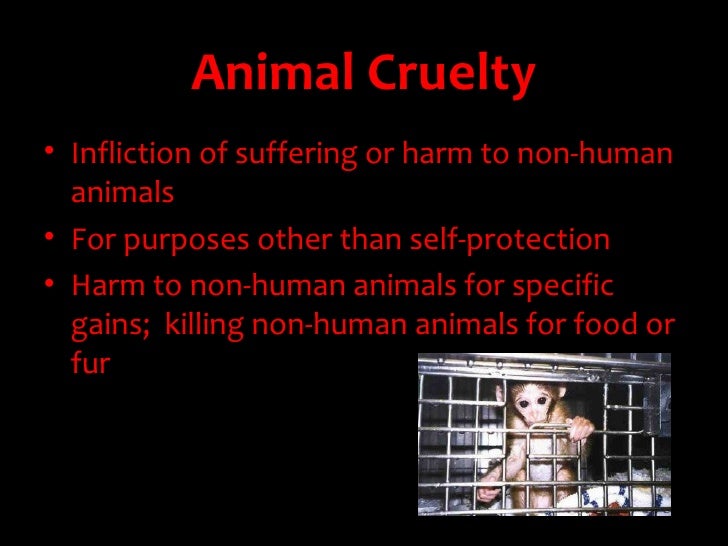In a world replete with complexities, where the plight of both humans and animals constantly oscillates in public discourse, the question of whether one should care about animal cruelty becomes pivotal. The ethos surrounding animal welfare is deeply intertwined with moral philosophy, social justice, and environmental sustainability. It beckons not only individual contemplation but also societal transformation. To grapple with this question requires not just a casual glance but an immersive exploration into ethical considerations, personal responsibility, and the broader implications of caring—or the lack thereof.
At the outset, it is crucial to understand what constitutes animal cruelty. It is not confined to overt acts of violence or neglect; it encompasses a spectrum of maltreatment, ranging from the indifferent abandonment of pets to the insidious exploitation in factory farming. This multifaceted nature calls for a nuanced understanding. As sentient beings, animals experience pain, suffering, and distress in remarkable ways, often mirroring human emotions. How can one dismiss their plight when scientific evidence increasingly supports their capacity for emotion and cognition?
Delving into the ethical frameworks surrounding animal rights reveals an array of philosophies. Utilitarianism posits that moral actions are dictated by their consequences, suggesting that if the suffering of animals can be alleviated for the greater good, it becomes an ethical imperative to do so. Conversely, Kantian ethics asserts that animals, while not rational beings as humans are, still warrant moral consideration. The principles of respect and dignity extend beyond human interactions; they incorporate a responsibility toward non-human animals. This philosophical dichotomy often leads to an inner turmoil for many individuals as they contend with societal norms versus ethical culpability.
As one reflects on the societal implications of animal cruelty, it is impossible to overlook the inherent connections between animals and human welfare. The industrialization of animal farming not only perpetuates ethical breaches but also contributes to environmental degradation, loss of biodiversity, and health crises among human populations. Factories treat animals as mere commodities, disregarding their welfare for profit margins. The ramifications extend beyond the immediate violence inflicted; they seep into the ecosystem, potentially endangering public health. As a result, ignoring animal cruelty is tantamount to endorsing a cycle of detriment to both animals and humans alike.
Furthermore, engaging with the subject of animal cruelty can catalyze a profound personal transformation. It prompts individuals to re-evaluate their dietary choices, consumer habits, and even recreational activities. Becoming aware of the suffering inherent in many products and services can lead to more conscientious decisions. For instance, the choice to adopt a plant-based diet or support ethical farming practices reverberates beyond personal health; it fuels an economic shift towards more humane treatment of animals. Each decision becomes a ripple in a larger pond, fostering a culture of compassion and responsibility.
The call to action against animal cruelty also bridges the gap between varied social movements. Just as advocacy for human rights intersects with environmentalism, the conversation about animal rights cannot be isolated. It offers an opportunity for solidarity among marginalized groups. Issues of discrimination, exploitation, and violence resonate across different entities of society, binding advocates of human and animal rights into a unified front. This collective approach amplifies awareness, demanding systemic change that upholds the dignity of all beings.
However, the road to empathy is not without its challenges. Many industries have entrenched interests that are resistant to change. The normalization of animal exploitation can breed apathy, making it easy for individuals to distance themselves from the harsh realities of animal cruelty. This disconnection often breeds an uncomfortable confrontation with one’s own complicity in a system that promotes suffering. Such self-reflection can provoke guilt or defensiveness, making it imperative to approach the discussion with understanding and compassion—for both humans and animals.
Moreover, the advent of social media has revolutionized how these issues are communicated. Disturbing images and stories of animal suffering surface frequently, often leading to outrage and activism. Yet, this can sometimes foster desensitization, as viewers scroll past tragedies that should evoke empathy. This paradox underscores the necessity for nuanced narratives that engage audiences emotionally while steering away from sensationalism. Storytelling should illuminate not just the cruelty but also the resilience and joy of animal lives. By showcasing positive change and the triumph of advocacy, one can inspire hope rather than hopelessness.
In conclusion, considering the question, “Should I care about animal cruelty?” reveals a tapestry of ethical, social, and personal implications. To disregard it is to ignore countless sentient lives that are not merely victims but also agents capable of enriching the world with their presence. Acknowledging their suffering compels humanity toward a fundamental re-evaluation of its values and actions. As individuals grapple with their own roles within society, an intrinsic curiosity about the depths of animal experiences beckons—a journey that promises to reshape perspectives and foster a more compassionate coexistence.








